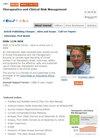Impact of Attendance to a Pharmacist-Managed Medication Adherence Clinic on Glycemic Control and Risk Factors for Non-Completion Among Persons with Type 2 Diabetes Mellitus in Selangor, Malaysia
IF 2.8
3区 医学
Q1 Pharmacology, Toxicology and Pharmaceutics
引用次数: 0
Abstract
Background: Diabetes mellitus (DM) is a chronic metabolic disorder affecting millions globally. Adherence to treatment is crucial for effective management.Objective: To compare clinical outcomes, specifically changes in haemoglobin A1c (HbA1c) and fasting blood sugar (FBS) levels, between DM patients who completed the pharmacist-managed Diabetes Medication Therapy Adherence Clinic (DMTAC) sessions and those who did not, and to identify risk factors associated with non-completion of DMTAC.
Methods: This multicenter, retrospective study included patients with DM attending DMTAC at five Ministry of Health centers from January 2018 to December 2020. Patients were categorized based on their completion of DMTAC sessions: those who completed at least four sessions and those who did not as per DMTAC protocol. The changes in HbA1c and FBS levels between the groups were analyzed. Logistic regression was employed to identify risk factors for non-completion of DMTAC.
Results: A total of 198 patients were included, comprising 49% male with a mean age of 56.52, ± 12.91 years. The complete group consisted of 49% (n=99) of the patients, while the did not complete group included 50.5% (n=100). A statistically significant reduction in FBS levels from initial to final measurements was observed in the complete group compared to the did not complete group (P=0.024). Female gender, higher education levels, and a longer duration since DM diagnosis were significantly associated with non-completion of DMTAC.
Conclusion: Diabetic patients attending at least four DMTAC sessions showed potential improvements in FBS levels. To enhance attendance at DMTAC sessions, healthcare professionals should focus on patients identified with risk factors for non-completion of DMTAC.
马来西亚雪兰莪州 2 型糖尿病患者参加药剂师管理的用药依从性门诊对血糖控制和未完成用药的风险因素的影响
背景:糖尿病(DM)是一种慢性代谢性疾病,影响着全球数百万人。坚持治疗是有效管理的关键:目的:比较完成药剂师管理的糖尿病药物治疗依从性门诊(DMTAC)疗程和未完成疗程的糖尿病患者的临床结果,特别是血红蛋白A1c(HbA1c)和空腹血糖(FBS)水平的变化,并确定与未完成DMTAC疗程相关的风险因素:这项多中心回顾性研究纳入了2018年1月至2020年12月期间在卫生部五个中心参加DMTAC的糖尿病患者。根据DMTAC疗程的完成情况对患者进行分类:按照DMTAC协议至少完成四次疗程的患者和未完成疗程的患者。分析了各组之间 HbA1c 和 FBS 水平的变化。采用逻辑回归法确定未完成 DMTAC 的风险因素:共纳入 198 名患者,其中男性占 49%,平均年龄(56.52±12.91)岁。完成组患者占 49%(人数=99),未完成组患者占 50.5%(人数=100)。与未完成组相比,完成组的 FBS 水平从初始测量到最终测量均有统计学意义上的明显降低(P=0.024)。女性性别、较高的教育水平和较长的糖尿病确诊时间与未完成 DMTAC 有明显关联:结论:至少参加四次 DMTAC 课程的糖尿病患者的 FBS 水平有可能得到改善。为提高 DMTAC 会议的出席率,医疗保健专业人员应重点关注被识别出存在未完成 DMTAC 风险因素的患者。
本文章由计算机程序翻译,如有差异,请以英文原文为准。
求助全文
约1分钟内获得全文
求助全文
来源期刊

Therapeutics and Clinical Risk Management
HEALTH CARE SCIENCES & SERVICES-
CiteScore
5.30
自引率
3.60%
发文量
139
审稿时长
16 weeks
期刊介绍:
Therapeutics and Clinical Risk Management is an international, peer-reviewed journal of clinical therapeutics and risk management, focusing on concise rapid reporting of clinical studies in all therapeutic areas, outcomes, safety, and programs for the effective, safe, and sustained use of medicines, therapeutic and surgical interventions in all clinical areas.
The journal welcomes submissions covering original research, clinical and epidemiological studies, reviews, guidelines, expert opinion and commentary. The journal will consider case reports but only if they make a valuable and original contribution to the literature.
As of 18th March 2019, Therapeutics and Clinical Risk Management will no longer consider meta-analyses for publication.
The journal does not accept study protocols, animal-based or cell line-based studies.
 求助内容:
求助内容: 应助结果提醒方式:
应助结果提醒方式:


